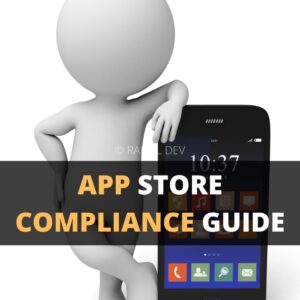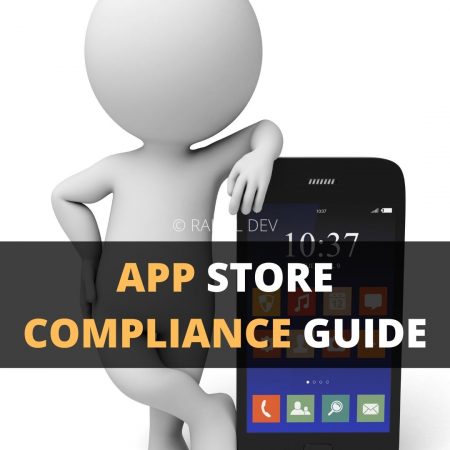App Store Terms Compliance
Explore the Process to Comply With App Store Guidelines

Understand Practical Aspects
Understand how to prevent removal of Apps from App Stores

Explore the Process to Comply With App Store Guidelines

Understand how to prevent removal of Apps from App Stores

Protect your innovations across multiple countries and create strong patent portfolio to boost business valuation
Local and global brand protection through international trademark registrations
Extensive research and business writing for technical whitepapers and B2B content products
With the rapidly growing number of mobile apps, developers need to learn about protecting their mobile app from rejection and termination with this comprehensive app store compliance guide. The mobile app market is expanding rapidly, with millions of apps competing for user attention. As a developer, protecting your app from rejection and termination is crucial. This comprehensive guide explores the risks of app termination and provides strategies for maintaining app store compliance.
App termination can result from various infractions, including intellectual property violations and non-adherence to platform guidelines. When an app is terminated, it doesn’t simply disappear; it triggers a cascade of consequences. These include significant revenue loss, reputation damage, and erosion of user trust. In today’s competitive landscape, even a brief suspension can cause lasting damage as users migrate to alternatives. For startups and small developers, termination can be catastrophic. It often leads to complete operational shutdown, especially when the business model relies heavily on app-based revenue. An app rejection serves as a crucial warning, signaling the need for immediate attention to compliance efforts.
This article covers following topics:
Importance of App Store Compliance
Understanding App Store Guidelines
Common Reasons for App Rejections
Consequences of Non-Compliance
Maintaining Compliance with App Store Guidelines

Adhering to app store guidelines is not merely about following rules; it’s a vital step in protecting your app and business from severe consequences. Ensuring compliance involves understanding platform-specific terms, including restrictions on content, functionality, and user data management. Both Apple’s App Store and Google Play Store enforce strict policies to protect users and maintain ecosystem integrity. Non-compliance can lead to app rejection or, in severe cases, termination. Repeated violations may escalate quickly, from initial warnings to permanent removal from the platform.
Developers must adopt a proactive stance in their compliance efforts. This includes, continuously updating apps to reflect policy changes, ensuring all aspects align with app store guidelines, and, regularly auditing for compliance. This approach not only helps avoid rejection but also strengthens the app’s position in a crowded marketplace, fostering longevity and user trust.
Apple compliance and Google Play compliance are critical for success in today’s app marketplace. Both platforms have stringent requirements ensuring user safety and platform integrity. Apple’s App Store Review Guidelines cover, UI design, Content usage, and, Privacy laws, wherein Apple mandates that apps must not infringe on intellectual property rights, avoid offensive content, and adhere to strict performance standards. Apps that crash or fail to load properly face immediate rejection.
Google Play compliance focuses heavily on user experience and security. The Google Play Developer Program Policies require, transparency in user data handling, prohibition of deceptive behaviors, and consistent experience across devices and OS versions. Thorough testing before submission is essential to meet these standards. Non-compliance with app store requirements can lead to rejections, delaying your app’s launch and damaging your reputation.
Understanding common app rejection reasons helps developers avoid pitfalls during submission. Major causes include, non-compliance with privacy requirements when the apps failing to disclose data collection, usage, or sharing practices are often rejected, poor app performance when the apps that crash, load slowly, or lack stability are unlikely to pass review, design guideline violations including incorrect use of UI elements or inconsistent user experience across devices can result in rejection, and inaccurate or misleading descriptions including, promotional text, screenshots, and descriptions must accurately reflect app functionality. By proactively addressing these issues, developers can increase approval likelihood and ensure a smoother launch.
Trademark laws are essential for protecting intellectual property in app development. Developers must understand how app trademarks work to avoid legal issues and potential rejections. To avoid trademark infringement, conduct thorough trademark research early in development, search databases like USPTO or WIPO, consider common law trademarks, consult with a trademark attorney for comprehensive trademark searches, and be prepared to rebrand if potential conflicts are identified. A case study of a luxury watch app illustrates the consequences of trademark violations. The app allowed users to create Apple Watch faces resembling high-end brands without permission. Despite warnings, the developers continued offering infringing designs, resulting in app removal and legal action.
Marketing ethics are crucial in app compliance, especially regarding truthful advertising. Apple and Google Play have strict policies against misleading ads to protect users and maintain platform credibility. Best practices for ethical app marketing include, ensuring all advertising content accurately reflects app capabilities, being transparent about in-app purchases, subscriptions, and data collection, regularly reviewing and updating marketing materials, and, conducting audits to ensure ongoing compliance with guidelines. A fitness app case study demonstrates the consequences of misleading advertising. The app falsely promised significant weight loss in a short period, using fabricated before-and-after photos and testimonials. Despite initial success, user complaints led to its removal from both Apple and Google Play stores.
Data protection for apps is governed by strict regulations like GDPR in the EU and CCPA in the US. These regulations ensure user privacy and give individuals control over their data. To maintain app data security and comply with regulations, implement data minimization practices, use encryption for sensitive data, conduct regular security audits, provide user rights management tools, and, ensure third-party services are compliant. Transparent data handling and obtaining proper user consent are crucial. Apps must provide clear privacy policies detailing data collection, usage, and user rights. This information should be easily accessible, and users should actively agree before any data collection occurs.
When your app is rejected, a prompt response is essential. Follow these steps, review feedback from the app store review team, identify and address all issues thoroughly, document changes and explain how you resolved each issue, conduct comprehensive testing before resubmission, and consider consulting with an app compliance expert. The common pitfalls in resubmissions include, failing to address all highlighted issues, resubmitting too quickly without thorough testing, and, overlooking minor problems while fixing major ones. To avoid these, carefully review feedback, fix all issues, and conduct comprehensive testing before resubmitting. Ensure your app’s metadata, descriptions, and screenshots are accurate and compliant.
Non-compliance with app store guidelines can devastate a developer’s business. The impact of app termination extends beyond the immediate loss of a distribution platform. It can fundamentally threaten your business’s future, resulting in, loss of investments in development, marketing, and user acquisition, direct financial losses, damage to user trust and brand reputation, and reduced market position and competitive edge. Repeated violations can lead to permanent account suspension, barring developers from submitting new apps or updates. This penalty can be particularly devastating for those relying on these platforms for distribution.
In addition, the financial costs of non-compliance include, lost revenue from app sales and in-app purchases, potential fines and legal fees, and costs associated with rebranding or launching new apps. Reputational damage can be severe and long-lasting, leading to decreased user retention, negative reviews, and difficulty attracting new users or partners.
Maintaining compliance with app store guidelines is a critical business requirement in today’s regulated digital environment. Non-compliance can result in severe consequences, including app termination, account suspension, and significant financial and reputational damage. To avoid these harsh repercussions, developers must adopt proactive compliance strategies, including, staying informed about the latest app store guidelines, regularly updating apps to meet new requirements, and conducting periodic audits to ensure all aspects remain compliant. By making compliance a core part of your app development strategy, you can safeguard your apps against termination and ensure continued success in the competitive app marketplace.
Links to Official App Store Guidelines
For detailed compliance information, developers should consult the official guidelines provided by the app stores. These resources offer comprehensive insights into the requirements and best practices for maintaining compliance, Apple App Store Guidelines and Google Play Developer Policy Center. Several tools and services are available to help developers maintain compliance with app store guidelines. These tools can automate the audit process, identify potential issues, and ensure that your app meets all necessary requirements before submission. For App Compliance Software, tools like Appfigures and Sensor Tower can provide insights into compliance trends and help monitor app performance, and for Compliance Audit Services, engaging with professional audit services can provide an in-depth review of your app’s compliance status. For developers looking to deepen their understanding of app compliance and related legal issues, the following resources are recommended: The Business of iOS App Development by Dave Wooldridge and Michael Schneider offers comprehensive insights into compliance and best practices for iOS apps, Navigating the Legal Minefield of App Development by John Villasenor provides an in-depth analysis of legal considerations for app developers.

As a business coach and thought leader, I cannot emphasize enough the importance of innovation, new software patents, mobile apps, and patents for tech companies, startups, and entrepreneurs. The world is rapidly evolving, and staying ahead of the curve is vital for success. Embracing technological advancements such as blockchain and AI can unlock unprecedented opportunities, streamline operations, and propel businesses into the future with competitive valuation via intangible assets.
Click Here for AI Startup Valuation Guide.
For instance, blockchain technology can revolutionize supply chain management and secure data sharing wherein innovative business models are explained to the audience via technical whitepapers, while AI can automate and optimize decision-making processes. Mobile apps are no longer just a luxury; they have become essential tools for engaging customers and offering personalized experiences. Furthermore, securing digital innovation patents is crucial for protecting intellectual property, fostering innovation, and maintaining a competitive edge. By investing in these areas, businesses can position themselves as industry pioneers and pave the way for a prosperous future after thoroughly conducting the due diligence and reviewing the legal opinion letters, which in case of digital assets can assist in determining the tokens as utility assets or coins as utility tokens before listing the assets at an exchange.
Our team of advanced patent attorneys assists clients with patent searches, drafting patent applications, and patent (intellectual property) agreements, including licensing and non-disclosure agreements. Advocate Rahul Dev is a Patent Attorney & International Business Lawyer practicing Technology, Intellectual Property & Corporate Laws. He is reachable at rd (at) patentbusinesslawyer (dot) com & @rdpatentlawyer on Twitter.
Quoted in and contributed to 50+ national & international publications (Bloomberg, FirstPost, SwissInfo, Outlook Money, Yahoo News, Times of India, Economic Times, Business Standard, Quartz, Global Legal Post, International Bar Association, LawAsia, BioSpectrum Asia, Digital News Asia, e27, Leaders Speak, Entrepreneur India, VCCircle, AutoTech).
Regularly invited to speak at international & national platforms (conferences, TV channels, seminars, corporate trainings, government workshops) on technology, patents, business strategy, legal developments, leadership & management.
Working closely with patent attorneys along with international law firms with significant experience with lawyers in Asia Pacific providing services to clients in US and Europe. Flagship services include international patent and trademark filings, patent services in India and global patent consulting services.
Global Blockchain Lawyers (www.GlobalBlockchainLawyers.com) is a digital platform to discuss legal issues, latest technology and legal developments, and applicable laws in the dynamic field of Digital Currency, Blockchain, Bitcoin, Cryptocurrency and raising capital through the sale of tokens or coins (ICO or Initial Coin Offerings).
Blockchain ecosystem in India is evolving at a rapid pace and a proactive legal approach is required by blockchain lawyers in India to understand the complex nature of applicable laws and regulations.